The David Suzuki Foundation was born out of public concern. So many caring people responded to David Suzuki’s 1989 radio series It’s a Matter of Survival that he and spouse Tara Cullis decided to follow the talk with action.
Meeting with a group of activists and thinkers on Pender Island, they identified the need for a solutions-based organization to tackle environmental crises. The Foundation was incorporated on September 14, 1990.
It has grown from a small group taking on national and international issues to a larger, bilingual one focusing on Canada’s place and role in a world facing multiple crises, from biodiversity loss to climate disruption. With offices in Vancouver, Montreal and Toronto, the Foundation focuses on evidence-based solutions aimed at climate resilience, ocean health, biodiversity protection, recognition of Indigenous rights and title, and public empowerment.
At the Foundation, we believe respect for nature and interdependence with it must be our species’ top priority.
We began DSF under the Worldwatch Institute’s urgent call for the 1990s to be the turnaround decade. The early years were tough, as we managed projects on no budget and no salaries. But the public wanted us to succeed and encouraged us at every step, driving us through three strong, focused and effective decades, preparing us for the big one we now face.
Tara Cullis and David Suzuki, co-founders
1991-1995
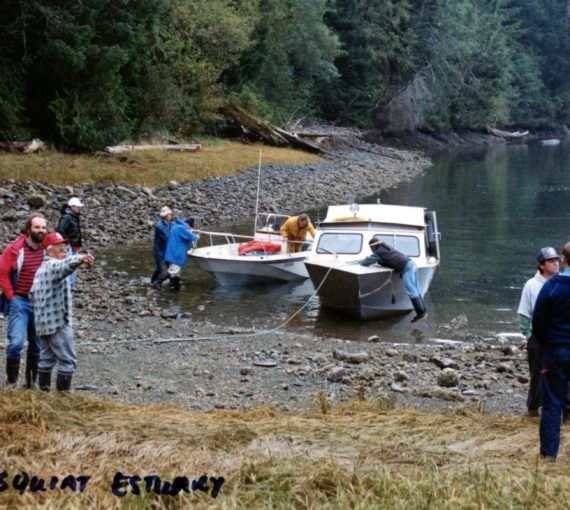
1991
Foundation milestones
- Hesquiat Harbour project initiated to rehabilitate a damaged clam ecosystem on Vancouver Island.
- Our first office opens in Vancouver.
- David Suzuki, Tara Cullis, Guujaaw, Raffi Cavoukian and Wade Davis write The Declaration of Interdependence.

1992
Foundation milestones
- Research station opens to help the Kayapo protect 11.5 million hectares of the lower Amazon.
- DSF participates in UN Earth Summit in Rio de Janeiro; 12-year-old Severn Cullis-Suzuki delivers a moving speech to protect Earth for future generations.
- We co-sponsor Earth Parliament.
Environmental milestones
- Convention on Biological Diversity.
- Convention on Climate Change sets non-binding CO2 targets for industrial countries.
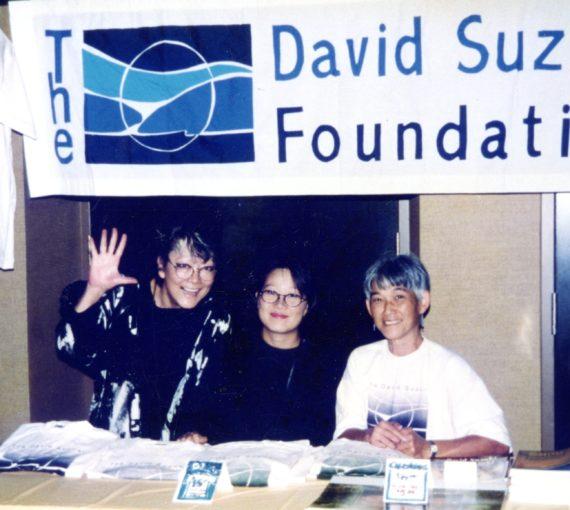
1993
Foundation milestones
- Ainu project helps indigenous people of northern Japan protect their sacred salmon, owl and bear populations.
- DSF moves to new eco-friendly, geothermal offices.
- Jim Fulton hired as our first executive director.
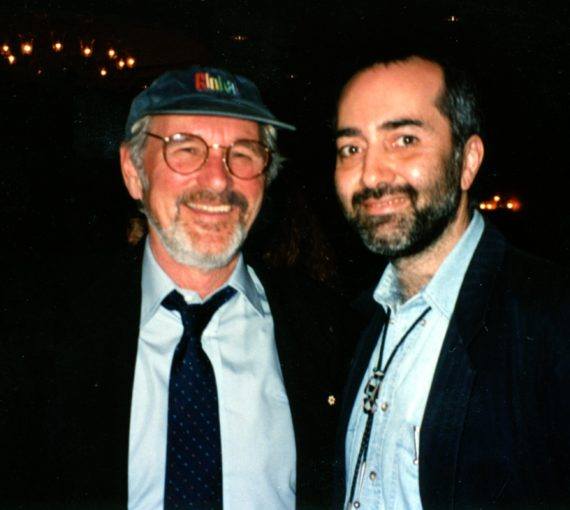
1994
Foundation milestones
- LA Event, April 14, 1994. Initiated by the late John Candy to bring together Canadian talent to help raise awareness and funds for the David Suzuki Foundation.
- Published report “The Future of British Columbia Fisheries.”
Environmental milestones
- International Union for Conservation of Nature (IUCN) issues revised list on endangered species.

1995
Foundation milestones
- First volunteer coordinator hired for our volunteer program.
- “Fish on the Line” report released to national acclaim, calling for overhaul of fisheries.
Environmental milestones
- Second IPCC assessment report.
1996-2000
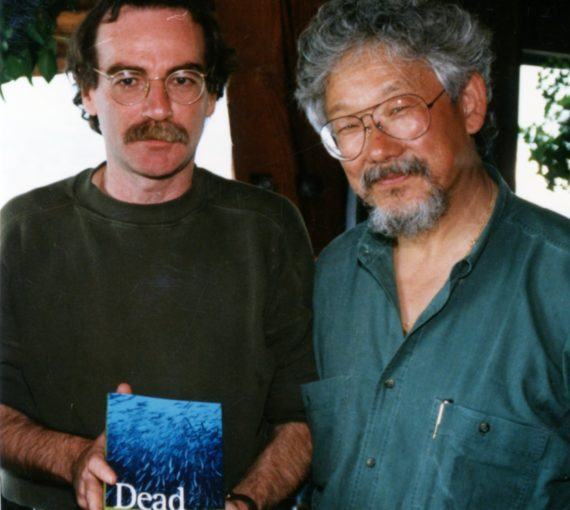
1996
Foundation milestones
- Launched our first book, Dead Reckoning, by Terry Glavin.
- First communications director hired.
- Our research shows that closed-containment salmon farms are the best way to protect salmon from impacts of aquaculture.
- Joined the B.C. Endangered Species Coalition to protect species at risk.
Environmental milestones
- National accord for the protection of species at risk.

1997
Foundation milestones
- David Suzuki’s The Sacred Balance is published.
- Staff attended UN Framework Convention on Climate Change in Kyoto. DSF prepares a briefing paper called “The Role of Government” for then-Finance Minister Paul Martin.
- Worked with Musqueam Band to restore Vancouver’s last salmon-bearing stream.
- Began producing reports on how Canada is vulnerable to climate change, and how to decrease emissions.
Environmental milestones
- UN Framework Convention on Climate Change in Kyoto.
- Canada Oceans Act enacted.
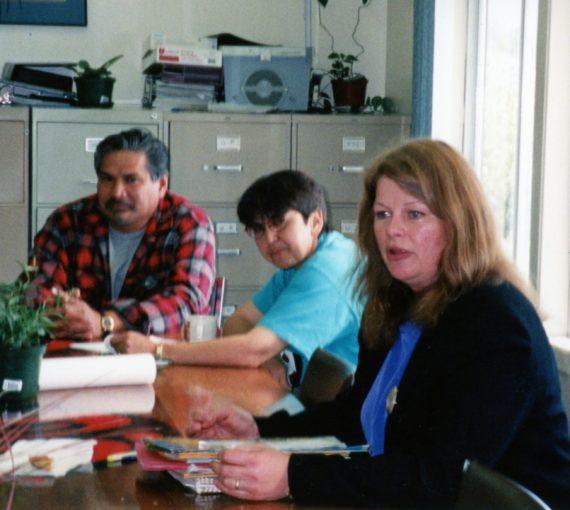
1998
Foundation milestones
- Tara Cullis goes on diplomatic tours of remote First Nations communities in B.C.
- Pacific Salmon Forest Project launches, a B.C. coastal fisheries, forestry and community project to support economic health while conserving important ecological and cultural areas.
- DSF opens a community economic development office in Prince Rupert and initiates projects in 10 remote areas in B.C.
- Joins effort to conserve culturally modified trees. B.C. Supreme Court rules they should be protected.
Environmental milestones
- Culturally modified trees given protection.
- Delgamuukw ruling confirming aboriginal title in B.C.
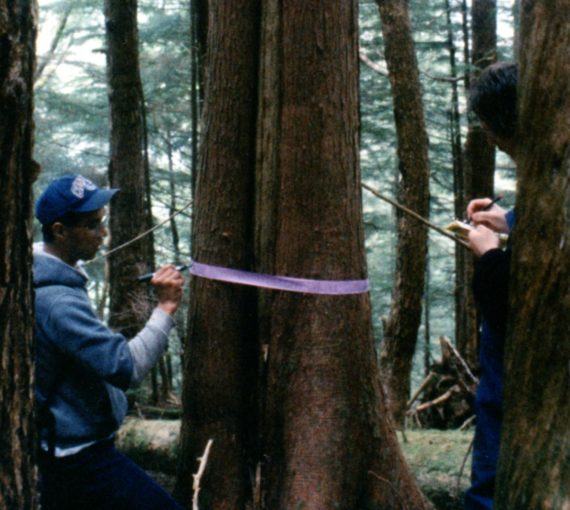
1999
Foundation milestones
- Pacific Salmon Forests project. Mapping and inventory of culturally modified trees provides basis for securing an injunction to halt logging on Banks Island.
- Supported research that shows how salmon fertilize forests, building a greater understanding of how salmon, bears and forests work together.
- Supported the Metlakatla in re-establishing its sustainable urchin fishery.
- First of David Suzuki’s Science Matters columns published.
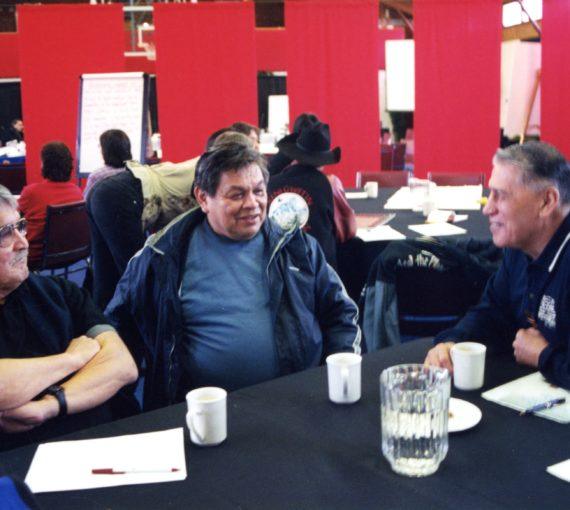
2000
Foundation milestones
- Initiated Turning Point process with Coastal First Nations, which united to call on provincial and federal governments to negotiate land-use issues.
- Produced “A Cut Above,” the first outline of ecosystem-based management standards for forestry.
- Released the “Scientists’ Declaration to Conserve Canada’s Coastal Temperate Rainforest,” signed by over 400 scientists.
- Commissioned groundbreaking study that showed B.C. farmed salmon have high levels of contaminants.
- Successfully blocked logging scheduled in 51 cutblocks.
Environmental milestones
- Walkerton, Ontario, contaminated water tragedy.
2001-2005
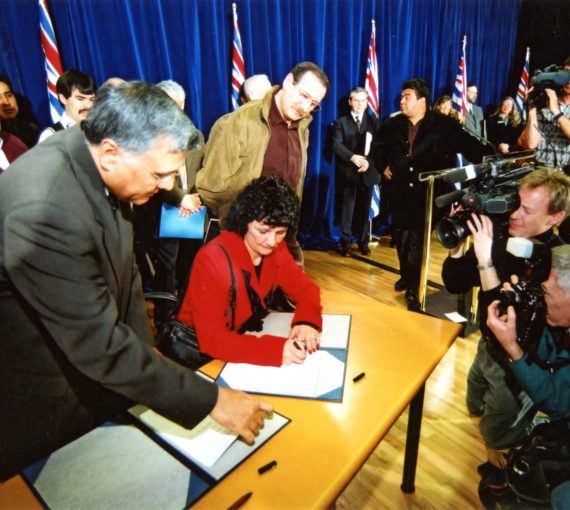
2001
Foundation milestones
- A landmark agreement with eight coastal First Nations is signed for environmentally responsible logging on B.C. coast.
- Helped launch the Forest Stewardship Council, for certification of sustainable forestry products.
- Presented seminars to show problems with farmed salmon to chefs, food writers and the food industry in Vancouver and Toronto.
Environmental milestones
- Third IPCC assessment report.
- Certification standards for sustainable forestry launched.
- Landmark agreement signed with Turning Point.
- Toyota Prius becomes first mass produced hybrid car on market.
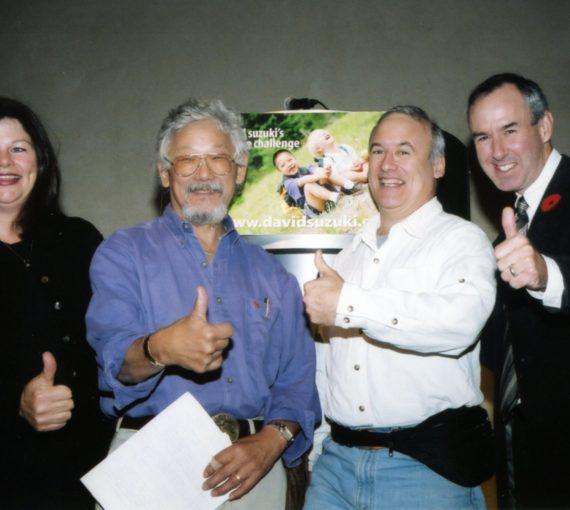
2002
Foundation milestones
- Nature Challenge is launched, asking people to pledge to take the challenge to decrease their impact on the planet.
- Helped improve Yukon placer mining regulations to protect streams and reduce pollution.
- Worked with the Musqueam and Sierra Legal Defence Fund to prevent a fish farm from dumping 1.5 million diseased Atlantic salmon into the Fraser River.
- Published our first solutions-based book, Good News for a Change.
- Canada ratifies the Kyoto Protocol, and Prime Minister Jean Chrétien sends us a personal letter to say our efforts were an important part of the consultation process.
Environmental milestones
- Turning Point opens office in Vancouver.
- Canada ratifies Kyoto Protocol.
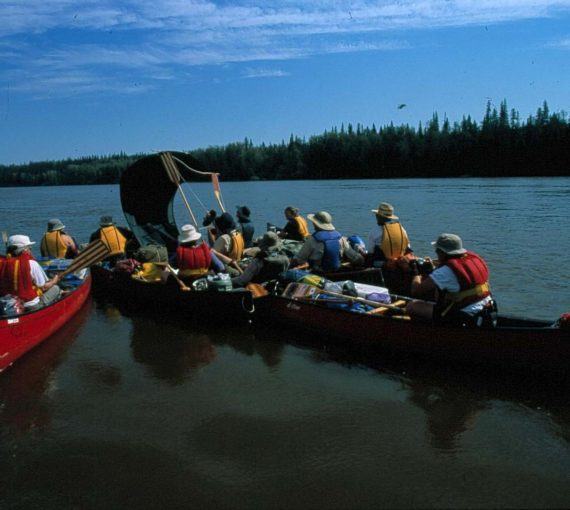
2003
Foundation milestones
- To raise awareness about the boreal forest, we helped organize the Boreal Rendezvous, where teams of paddlers travelled down 10 picturesque rivers.
- Reviewed BC Hydro’s proposed natural gas pipeline, and found it had high greenhouse gas emissions. Proposal is denied in 2004.
- Launched the Nature Challenge for Kids and with WWF distributed materials to over 7,000 teachers across Canada.
Environmental milestones
- Scientists report industrial fishing has killed off 90 per cent of world’s biggest and most economically important fish species.
- Turning Point becomes independent organization.
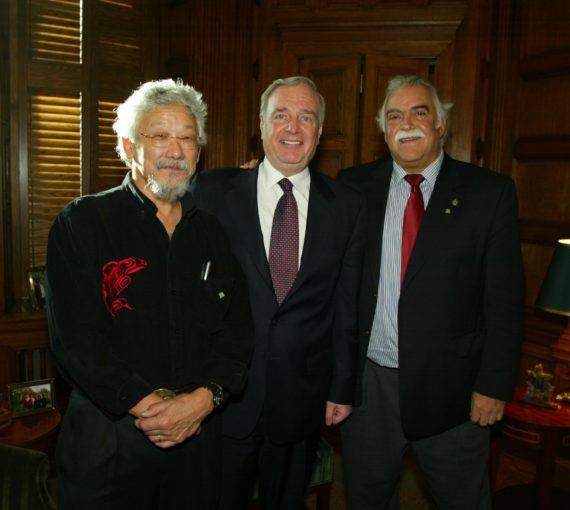
2004
Foundation milestones
- Prime Minister Paul Martin called our report “Sustainability Within a Generation” a “very important report” and hired the author, David Boyd, to work in the Privy Council Office.
- Opened our Ottawa office.
- Went to court to support a National Energy Board ruling to block construction of a gas-fired power plant near Abbotsford, B.C.
- Presented information on environmental impacts of offshore oil and gas exploration off the B.C. coast to federal review panels. Thousands of people voiced their support, so the government upheld the moratorium on oil and gas drilling in B.C.
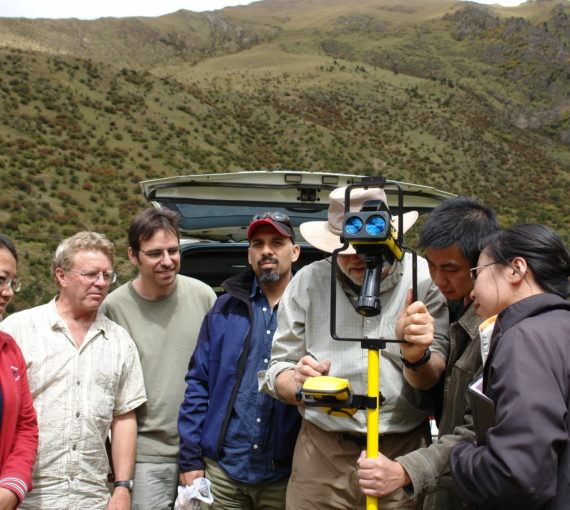
2005
Foundation milestones
- Forest and land team worked on the Four Great Rivers Project in Tibet to create a conservation plan for the Yangtze, Brahmaputra, Salween and Mekong river headwaters.
- Created a resource guide, “State of the Catch,” to help people buy sustainable seafood.
- Released recommendations for responsible shellfish aquaculture.
Environmental milestones
- Controversial electric plant prevented near Nanaimo.
2006-2010
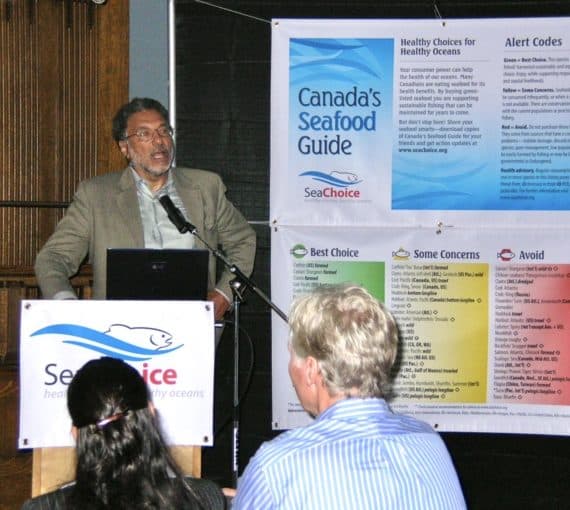
2006
Foundation milestones
- Launched SeaChoice program to help consumers choose sustainable seafood.
- Convinced B.C. government to protect 30 per cent of the Great Bear Rainforest.
- David Suzuki published his autobiography.
Environmental milestones
- Barnston Island and Richmond Garden City lands in B.C. Lower Mainland are protected from development.
- Thirty per cent of Great Bear Rainforest becomes protected.
- Quebec bans harmful lawn pesticides.
- VANOC commits to going carbon-neutral for 2010 Olympics.

2007
Foundation milestones
- David Suzuki goes on “If You Were Prime Minister” bus tour, visiting 41 cities in 30 days.
- Toronto office opens.
- Helped push through Ontario’s Endangered Species Act.
- Secured protected habitat for the monarch butterfly along the Ottawa River, and the piping plover shorebird in B.C.
- Helped shut down two proposed coal-fired plants, and convince the B.C. government to create emission-reduction targets and a moratorium on conventional coal-fired plants.
- Convinced over 500 members of the NHL Players’ Association to go carbon-neutral and raise awareness about slowing global warming.
Environmental milestones
- Fourth IPCC assessment report.
- Ontario gets new Species at Risk Act.
- Al Gore and IPCC receive Nobel Peace Prize.
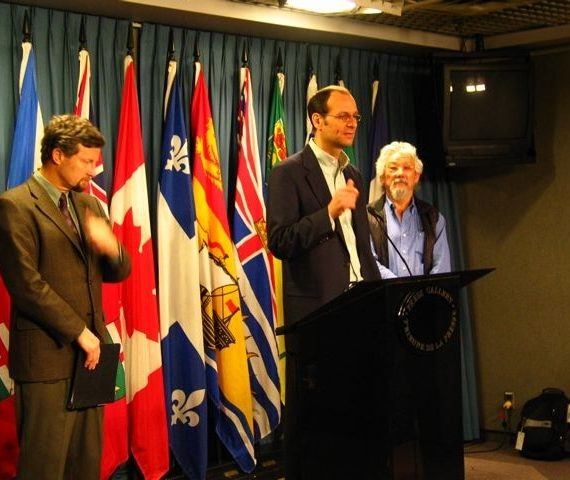
2008
Foundation milestones
- “Pricing Carbon; Saving Green” report released in Ottawa.
- Helped convince the B.C. government to release comprehensive Climate Action Plan, with a carbon tax and $1 billion investment in climate action.
- Hired new CEO, Peter Robinson.
- Opened our Montreal office and committed to being bilingual.
- Federal Sustainable Development Act passed, based on our report “Sustainability Within a Generation.”
- Launched our sustainable lifestyle program, Queen of Green (now Living Green), to show how to green your everyday life.
- Ontario Premier Dalton McGuinty commits to protect at least 225,000 square kilometres of Ontario’s far north boreal region, thanks to our advocacy.
- Jim Fulton passes away on December 21.
Environmental milestones
- Federal Sustainable Development Act is passed.
- ENGOs win Nooksack dace habitat court case.
- B.C. carbon tax implemented.
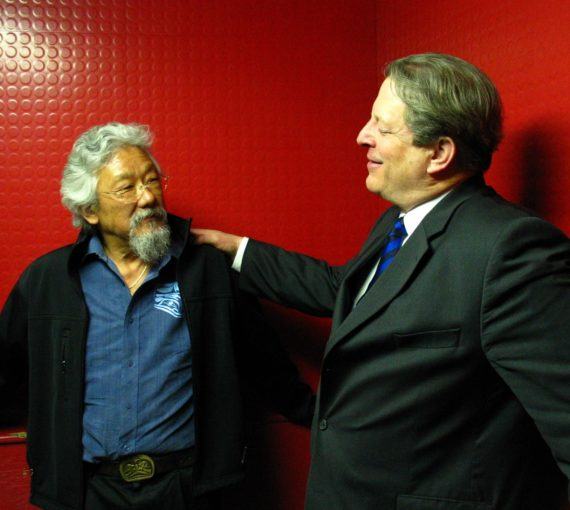
2009
Foundation milestones
- Joined with Al Gore to bring The Climate Project to Canada.
- Secured legal habitat protection for orcas (killer whales) on the Southwest Coast and for right whales on the East Coast.
- SeaChoice program partners with Overwaitea and other grocery stores to offer sustainable seafood.
- Started our Ambassadors program to teach people how to green their offices.
- Foundation and others launch One Million Acts of Green, encouraging Canadians to log one individual green good deed until the goal of one million green acts is reached.
Environmental milestones
- Green Energy Act is passed in Ontario.
- Climate Project comes to Canada.
- Canadian courts protect orca habitat.
- Inaugural Earth Run.
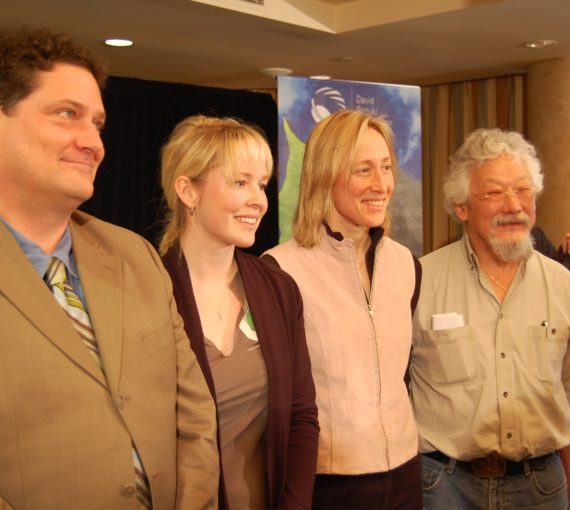
2010
Foundation milestones
- Vancouver Winter Olympics follow many of our recommendations to decrease greenhouse gas emissions.
- Helped convince key stakeholders to protect a huge part of the boreal forest, a historic deal and the largest protected forest area on Earth.
- Continued work to end the B.C. grizzly trophy hunt after the hunt was cancelled in Alberta because of public outcry.
- On September 14, the Foundation turns 20.
- David Suzuki goes on a book tour for The Legacy: An Elder’s Vision for Our Sustainable Future.
Environmental milestones
- Carbon-neutral Olympics.
- BP oil spill in Gulf of Mexico.
2011-2015
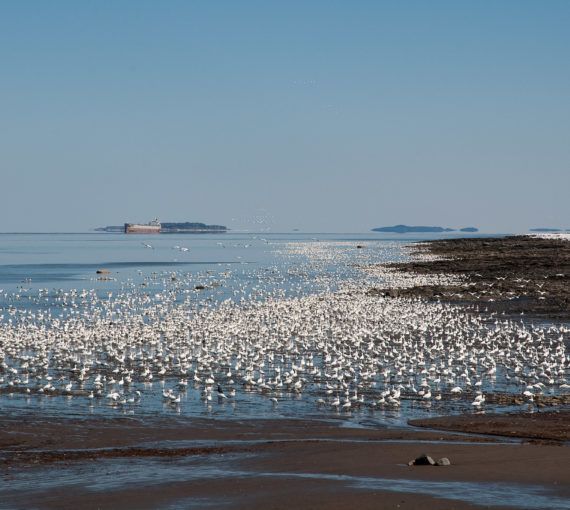
2011
Foundation milestones
- Protecting the St. Lawrence River. Our Living River campaign launches to build watershed stewardship and reconnect the millions of people who rely on the St. Lawrence for drinking water. In addition, DSF plays a pivotal role in creating the St. Lawrence Coalition, uniting organizations and communities in the fight for a moratorium on oil and gas exploitation in the Gulf.
- Our campaign to help establish Rouge National Park, Canada’s first urban national park, makes extraordinary progress. The park will stretch from Lake Ontario to the Greenbelt at the east end of Toronto, protecting more than 6,000 hectares of forests, fields, wetlands and streams.
- Involving new Canadians in climate solutions. Hired multicultural staff to work with Chinese and South Asian communities, holding roundtables, working with youth leaders and translating some of our work into multiple languages.
- DSF launches the Natural Capital Ambassadors program to work with local governments in B.C.’s Lower Mainland to protect and restore nature in local communities.
- Saving Fish Lake. DSF and other environmental organizations motivate thousands of Canadians to send letters to the government demanding a mining proposal near Fish Lake, B.C., be rejected. Their calls are heard and heeded.
- The Foundation adopts an Ethical Gift Acceptance policy to guide our fundraising and work with donors.
- DSF board crafts the Aboriginal Peoples Policy, renamed the Indigenous Peoples Policy in 2014, which states, “the David Suzuki Foundation recognizes the rights and title of Indigenous Peoples, guided by the United Nations Declaration on the Rights of Indigenous Peoples (2010) … [and] commits to respectfully engage with Indigenous Peoples when its work concerns their interests.”
- David celebrates his 75th birthday with schools throughout Canada. By using Telepresence and WebEx Technology, David and moderator George Stroumboulopoulos connect with and answer questions from Grade 7 students in 166 schools.
Environmental milestones
- The federal government formally commits to establishing Rouge National Park, Canada’s first urban National Park.
- Fish Lake near Williams Lake, B.C. is saved from a mining proposal that would have destroyed the lake, by draining it and disposing mine waste in it.

2012
Foundation milestones
- Soupstock. The Foundation unites over 200 top chefs from North America for Soupstock, a “culinary protest” in Toronto’s Woodbine Park. More than 40,000 people show up to celebrate local food and farms and protest the proposed Melanthon mega-quarry. One month later, the quarry application was withdrawn.
- DSF releases Visualizing the Value of Nature, the first-ever valuation of ecosystem services, in the future Rouge National Park.
- The Foundation guides creation of the Montreal greenbelt, publishes a report that highlights the state of ecosystems in the region and offers a blueprint and toolkit on how to achieve its creation within the next five years.
- Protecting Canadians’ health. By mobilizing thousands of supporters to send letters to the Quebec and federal governments, we help stop planned asbestos extraction from Jeffrey Mine in Quebec.
- DSF and four other organizations coordinate the largest march for the environment in the history of Canada, which assembled 250,000 people in Montreal on Earth Day.
- In June, DSF begins the 30 x 30 Nature Challenge, helping Canadians to get outside in nature 30 minutes a day for 30 days.
Environmental milestones
- On Earth Day, over 250,000 people rally in Montreal to stand up for nature and democracy.
- Asbestos extraction from Jeffrey Mine, Canada’s last asbestos mine, is halted. Canada stops exporting asbestos.
- A massive limestone quarry proposal in Melanthon township near Orangeville, Ontario, is stopped, protecting more than 2,300 acres of Ontario’s best farmland and saving 600-million litres of water per day.
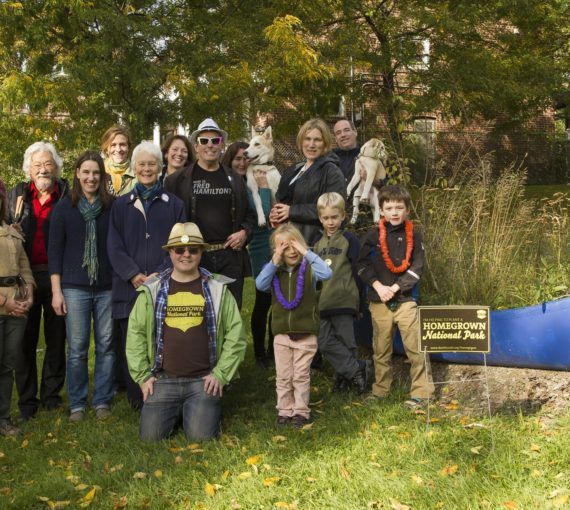
2013
Foundation milestones
- Creating Canada’s first Homegrown National Park. Inspired by authors Richard Louv and Douglas Tallamy. DSF’s Homegrown National Park project connects residents in Toronto’s West End neighbourhoods and partners with 14 community groups, recruits 21 neighbourhood Park Rangers, hosts 50+ events, plants 1,500 native plants and flowers and celebrates the first year with 1,000 residents on the Homegrown National Park Crawl.
- New reports published by the Trottier Energy Futures Project, a partnership with the Foundation, Canadian Academy of Engineering and the Trottier Family Foundation, show 80 per cent greenhouse gas reduction in Canada is doable by 2050.
- DSF and the Federation of Saskatchewan Indian Nations join forces and sign a memorandum of understanding, stating our mutual responsibility to protect nature.
- Bhutan’s Prime Minister Jigmi Thinley cites the David Suzuki Foundation’s “Declaration of Interdependence” as an inspiration for his country’s proposal to the United Nations for a new paradigm of development that states governments and economies must work to advance happiness for people and well-being for all life.
- DSF partners with Ecojustice and renowned environmental lawyer David Boyd to get legal protection that ensures all Canadians have a right to a healthy environment.
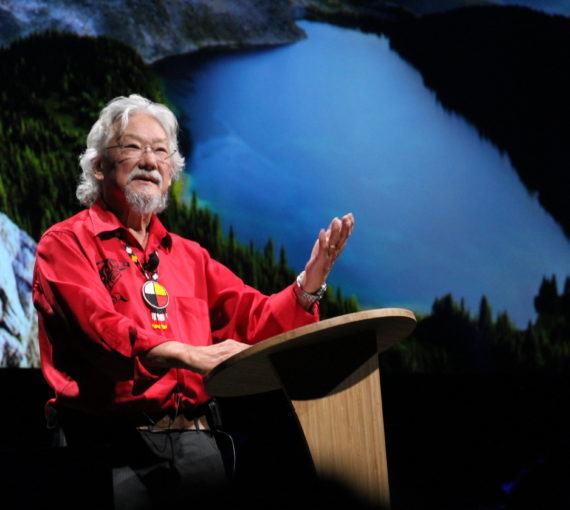
2014
Foundation milestones
- Cross-Canada Blue Dot Tour brings thousands of people together in 21 communities, with prominent Canadians and musicians joining from St. John’s to Victoria to build the movement to give all Canadians the constitutional right to live in a healthy environment.
- Montreal borough of Rosemont-La Petite-Patrie is the first community in Canada to recognize its citizens’ right to a healthy environment, followed by Richmond, The Pas, Vancouver, Montreal and Yellowknife.
- As part of the Homegrown National Park project, DSF launches a Toronto-based campaign to crowd-source a milkweed corridor through the city to support the return of monarch butterflies.
- Our network of Queen of Green sustainable lifestyle ambassadors grows as new volunteers help family, friends and neighbours reduce household waste, choose sustainable foods, minimize toxic exposure and build community, resulting in more people being empowered to help themselves and others live more gently on the planet.
- Species at risk — including Pacific humpback whales, marbled murrelets, Nechako white sturgeon and southern mountain caribou — get recovery plans thanks to a federal court challenge that DSF helped initiate.
Environmental milestones
- Bringing the monarch butterfly back from the brink. Canadians spot monarchs in numbers that haven’t been seen in years.
- Tsilhqot’in decision. The Supreme Court of Canada declares the Tsilhqo’tin have Aboriginal title to traditional lands including Xeni (Nemiah Valley) and much of the surrounding area, stretching north into Tachelach’ed (Brittany Triangle) and along the Tsilhqox (Chilko River).
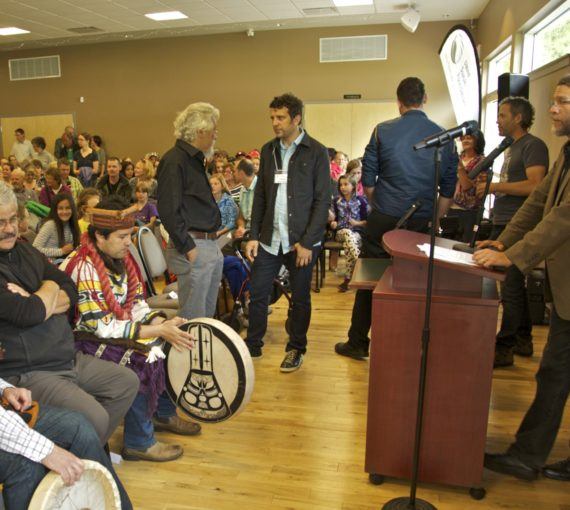
2015
Foundation milestones
- Celebrating Coastal Connections. In June, DSF holds 12 public events along B.C.’s coast to listen, celebrate, motivate and connect around our shared respect, concern and admiration for oceans. More than 1,500 written, oral and video stories are collected, followed by a DSF report and submission to the UN Committee on Economic, Social and Cultural Rights in early 2016.
- New Foundation report, “Sound Investment: Measuring the Return on Howe Sound Ecosystem Assets,” is published and shows watersheds of Howe Sound provide an estimated $800 million to $4.7 billion in natural services to the region each year.
- Thanks to more than 25,000 Foundation supporters who sent messages to the government, Ontario restricts the use of bee-killing neonicotinoid pesticides.
- 50 young adults attend Camp Suzuki: Howe Sound on Chá7elkwnech / Gambier Island to learn environmental leadership from a western, science-based perspective and traditional First Nations knowledge.
- Defending baby belugas. DSF with the Quebec chapter of Canadian Parks and Wilderness Society and others challenge TransCanada in court to abandon its plan to build an oil port in Cacouna, Quebec, in the middle of beluga whale breeding grounds. We won, thanks in part to 23,000 supporters who wrote letters to the fisheries minister through our website.
- “Sustainable Diversity” report is published, documenting the Foundation’s work to engage diverse communities in Canada in the green conversation. Following the report’s launch, the Sustainable Diversity Network is started.
Environmental milestones
- Ontario becomes the first jurisdiction in North America to ban bee-killing neonicotinoid pesticides.
- Beluga whale breeding grounds are successfully defended, and petro giant TransCanada abandons its plan to build an oil port in Cacouna.
- Paris Agreement. At COP 21, 195 countries adopt a worldwide climate agreement to reduce carbon output and keep global warming below 2 C.
2016-2020
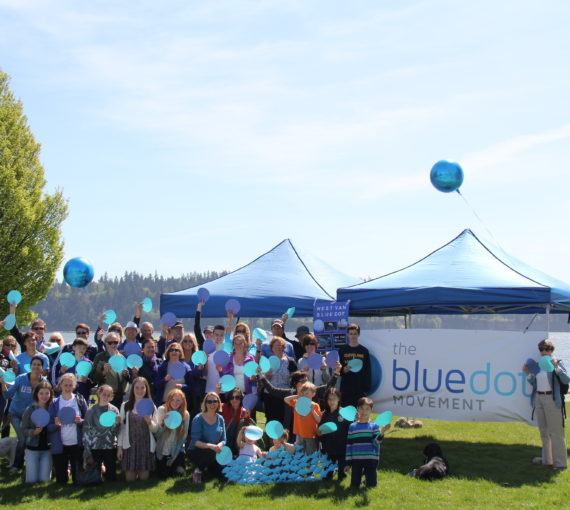
2016
Foundation milestones
- Right to a Healthy Environment push. DSF and Blue Dot volunteers inspire over 100,000 Canadians to sign Blue Dot pledge cards and 143 communities pass municipal declarations, representing 40 per cent of people in Canada.
- Upholding biodiversity. The Foundation continues to support Indigenous communities so that biodiversity values they hold dear are identified and maintained through provincial planning processes. With partners produce two reports: “Madziih (caribou) Tsaa? Ché Ne Dane: Knowledge and Restoration Study” with the Doig River First Nation, and “Atlas of Cumulative Landscape Disturbance in the Traditional Territory of the Blueberry First Nation 2016.”
- Marine plans for B.C.’s north coast and Vancouver Island’s central, north and west coast are completed and signed by the provincial government and First Nations, marking a 10-year achievement. This sets the stage for increasing ecosystem protection, bringing First Nations into greater co-management, and supporting evidence-based ecosystem-oriented ocean management.
- After years of negotiation, DSF helps turn the B.C. groundfish trawl into a well-regulated success story, setting up the world’s first habitat quota system, to limit damage to sensitive corals and sponges.
- In September, DSF celebrates its 25th anniversary.
- Sustainable seafood. Through work with SeaChoice, other ENGOs and retailers and suppliers, DSF improves availability of sustainable seafood in the marketplace, and co-authors the SeaChoice report “Taking Stock: Sustainable Seafood in Canadian Markets.”
- Fellowships program launches. Annual program to find three young scholars who embody David Suzuki’s special strengths of science excellence and the ability to inspire people to action. The first year’s research themes include finding climate solutions to accelerate Canada’s transition to a low-carbon future, with focus on Indigenous knowledge, transportation and economics.
Environmental milestones
- 2016 is the hottest year on record.
- St. Lawrence estuary belugas are protected by law. In May, the federal government bans anyone from destroying the whales’ critical habitat.
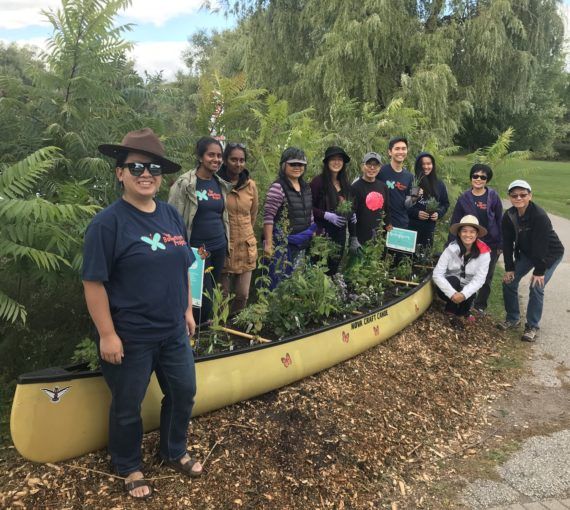
2017
Foundation milestones
- Butterflyway project. Building on the work of the first Hometown National Park Rangers, DSF trains volunteer Butterflyway Rangers in Richmond and Victoria, B.C.; Toronto and Markham, Ontario; and Montreal, Quebec, to establish citizen-led networks of butterfly-friendly habitat.
- Exposing B.C.’s fracking industry. Groundbreaking research by DSF in partnership with St. Francis Xavier University reveals methane pollution from well sites in B.C.’s oil and gas industry is at least 2.5 times higher than industry and government report.
- DSF stands with the people of Grassy Narrows in their fight for clean water and social justice. In February, Premier Kathleen Wynne commits $84 million to clean up the toxic mess.
- After nearly 15 years of campaigning, publishing scientific studies on grizzly bear management and mobilizing thousands of people to speak out against the trophy hunt, DSF celebrates a halt to the legal slaughter of grizzly bears in B.C.
- Ending the snapping turtle hunt. After DSF meets with Ontario government officials to share the science and threat of extinction of the snapping turtle, and with thousands of DSF supporters asking to close the hunt, the Ontario government ends the turtle hunt, a necessary move to protect this species of “special concern.”
- Pipeline cancelled. After four years of campaigning and tens of thousands of people coming together in an unprecedented mobilization of environmental groups, citizens, scientists, artists, unions, elected municipal officials and Indigenous communities, TransCanada cancels the Energy East pipeline project, which threatened the drinking water supply of 3.7 million people in Quebec.
- Peter Robinson retires. DSF hires new CEO, Stephen Cornish.
Environmental milestones
- Grizzly bear hunt ends in British Columbia and snapping turtle hunt ends in Ontario.
- Energy East pipeline project is cancelled.
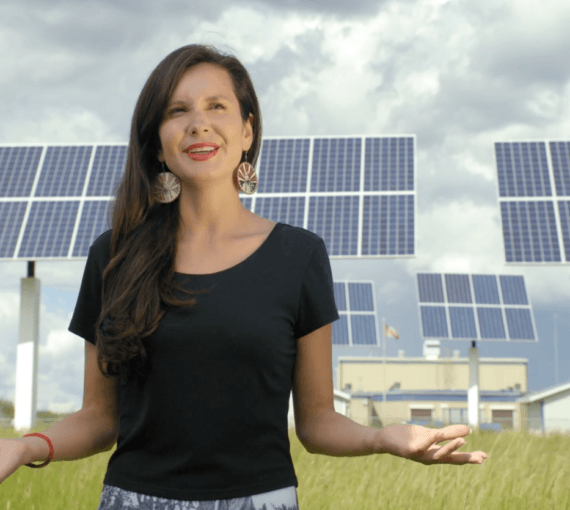
2018
Foundation milestones
- Charged Up, community-led renewable energy project. Building on the success of Canada’s clean-tech energy sector, the fastest-growing in our economy, Charged Up is amplifying people power, bringing people together in community to invest in a low-carbon economy on local, provincial and national fronts.
- Natural assets. DSF works with 11 Canadian municipalities to show that managing their natural assets will help them lessen the worst effects of climate change and boost their citizens’ health and well-being.
- The Blue Dot community continues to shine a spotlight on Canada’s need for environmental rights. In February, more than 500 scientists release a petition calling on the federal government to update the Canadian Environmental Protection Act and strengthen Canada’s environmental law.
- Healthier transportation. Research and work by the Foundation influences government: B.C. enables the largest transit and active transportation investment in its history to expand Metro Vancouver’s transit network. Quebec aims to be a North American leader with its $2.9 billion sustainable mobility policy. Toronto approves a 25-year plan prioritizing walking, cycling and biking in the downtown core.
- DSF’s Montreal office celebrates its 10th anniversary.
- “Reconciling Promises and Reality: Clean Drinking Water for First Nations” released. Report says government failing on eight of 14 indicators. The report encourages government to invest in First Nations–led approaches to resolving drinking water advisories, speed up system upgrades, provide funding for operations and maintenance and develop legislation and regulations with First Nations as equal partners.
- The book, Demain le Québec, by DSF Quebec staff, is launched. Inspired by the French documentary Demain, Demain le Québec tells inspiring stories of Quebecers who contribute, in their own ways, to transforming their communities to be more just, green and democratic.
Environmental milestones
- Nobel Prize for Economics is shared by William D. Nordhaus and Paul M. Romer for their work with models that show “how the market economy interacts with nature and knowledge.”
- In August, ninth-grade student Greta Thunberg begins missing school to strike for climate action outside of the Swedish Parliament, and inspires a rising global youth movement to demand action on climate change.
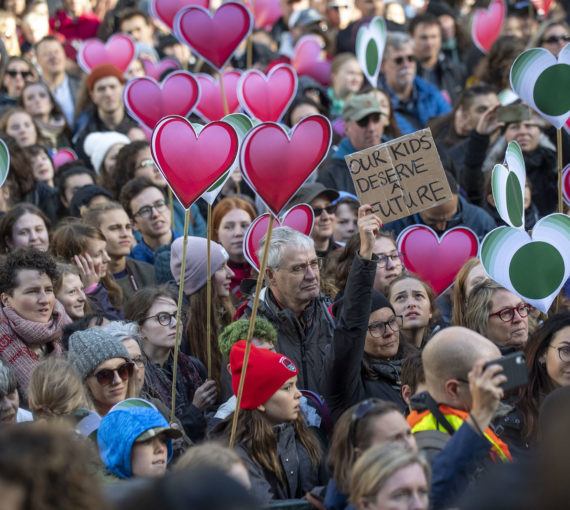
2019
Foundation milestones
- Youth demand climate action. Fifteen youth from six provinces and a territory stand up for their future and take the federal government to court for contributing to perpetuating climate change.
- Fast-tracking the move to renewables. We launch Clean Power Pathways, a three-year project to deliver choices to meet our energy and climate goals, and publish “Zeroing in on Emissions: Charting Canada’s Clean Power Pathways,” a report that identifies 10 strategies for Canada to reduce emissions to or near zero by mid-century.
- DSF goes to court in Regina and Toronto to support the federal government’s ability to apply effective climate policy solutions on a national scale. Both cases are decided in the federal government’s (and our) favour.
- More than 200 MPs and candidates from all major political parties sign our MP Pledge for Environmental Rights leading up to the federal election.
- Defending coastal waters. DSF continues the push to safeguard marine ecosystems from coast to coast to coast and helps influence changes to government legislation.
- Interactive caribou map. To help restore and protect Canada’s caribou herds, which are threatened with extinction throughout the country, DSF launches an interactive online map that combines the latest science with first-hand accounts from Indigenous communities, and highlights the crisis caribou face and the solutions we can take to help them recover.
- CliMate launches — a chatbot to coach climate conversations, providing an innovative and easy way to encourage people to talk about climate change, and build skills to listen, be empathic and find common ground.
Environmental milestones
- Canada makes an international commitment to strengthen protection of at-risk marine ecosystems; changes the Oceans Act and Petroleum Resources Act to react more efficiently to prevent harmful activities in marine protected areas; and renews the Fisheries Act that defends coastal ecosystems, estuaries and water access and quality.
- Greta Thunberg’s urgent call for climate action, to “unite behind the science,” and meetings with youth activists and world leaders galvanizes four million people worldwide to join the global climate strike on September 20, the biggest climate demonstration in history.
- Time magazine names Greta Thunberg 2019 Person of the Year.
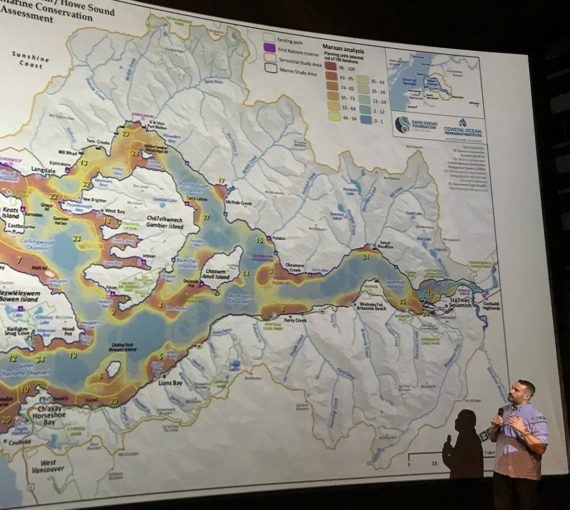
2020
Foundation milestones
- Mapping marine conservation, a collaborative partnership with Ocean Wise. In March we launch a digital conservation map of the ecologically rich fiord bordering Vancouver: Atl’ka7tstem/Howe Sound, featuring more than 140 data layers ranging from estuaries to shipping routes, herring-spawning grounds and logging sites. The map also uses computer modelling to highlight marine biodiversity hot spots and recommends 34 areas for protection and management.
- Court win for oceans. After DSF and others voice opposition for more than a decade to a proposed project in the Gulf of St. Lawrence, a Newfoundland and Labrador court invalidates the Old Harry licence to drill in the gulf, protecting endangered North Atlantic whales, threatened fish and sea turtles.
- Montreal C40 Climate Project. After two years of meeting and collaborating with leaders and experts from multiple sectors to help Montreal build a climate plan and become carbon-neutral by 2050, we sign off our Climate Advisory Committee’s final submission to the mayor with co-chair Caisse de Dépot on March 31.
- The Foundation and more than 230 national, provincial and local organizations unite to urge Canada’s prime minister to make nature central to a green, just recovery from COVID-19.
- In September, the David Suzuki Foundation turns 30.
- Stephen Cornish leaves DSF; Ian Bruce becomes acting executive director.
- Reconciling Ways of Knowing, a groundbreaking traditional Indigenous knowledge and science forum begins. These dialogues between Indigenous knowledge- keepers and scientists, including David Suzuki, aim to build relationships and open pathways to live in greater balance with the planet and each other.
- In December, after decades of research and advocacy by DSF and others, the federal government decides to phase out salmon farms in the Discovery Islands of B.C., the first step towards moving open- net pens out of the water by 2025.
Environmental milestones
On March 11, 2020, the World Health Organization declares the novel coronavirus (COVID-19) outbreak a global pandemic.
2021-2022
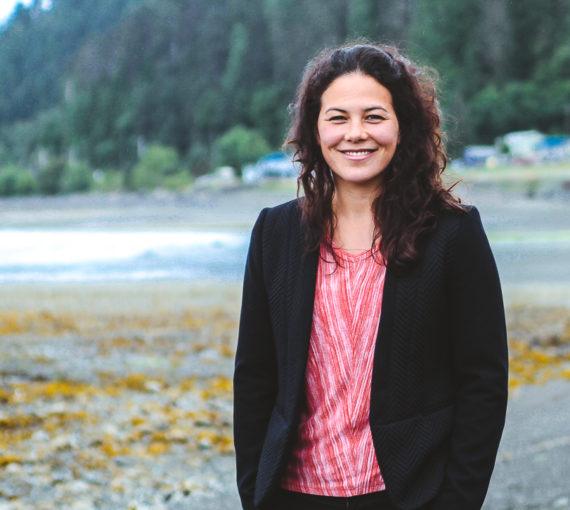
2021
Foundation milestones
- Landmark win for national climate action. On March 25, the Supreme Court of Canada ruled that the federal government’s Greenhouse Gas Pollution Pricing Act is constitutional. DSF, represented by Ecojustice lawyers, was an intervener in lower court proceedings in Saskatchewan, Ontario and Alberta and is the first organization in Canada to argue that the climate crisis represents a national emergency, and the federal government must have the power to act under the Constitution.
- Strengthening environmental protection. The Foundation, other ENGOs and countless supporters push the federal government for stronger environmental laws, leading to the Canadian Net-Zero Climate Accountability Act becoming law on June 29; the Bill to Modernize the Canadian Environmental Protection being introduced and the designation of plastics as toxics being added to CEPA’s list of toxic substances.
- Severn Cullis-Suzuki is hired as executive director.
- Natural assets and coastal resilience. DSF expands its Municipal Natural Assets Initiative and research, publishing reports: “Managing Natural Assets to Increase Coastal Resilience, Pointe-du-Chêne, New Brunswick;” “Managing Natural Assets to Increase Coastal Resilience, Gibsons, British Columbia” and a “Guidance Document for Municipalities.”
- Empowering people in place. DSF launches Future Ground Network / Réseau Demain le Québec (one English, one French) nationally in February. These online organizing hubs are platforms for local groups to gather, start local initiatives, promote their work, host events and push policy.
- Recognizing local excellence. The Future Ground Prize, building on our Quebec office’s Prix Demain, is kicked off in Ontario. The contest recognizes people coming together in their communities to create innovative projects that protect the planet for a healthy future.
Environmental milestones
- Though delayed by a year because of COVID-19, world leaders at COP26 – the United Nations climate change conference in Glasgow, Scotland, pledge to end deforestation by 2030.
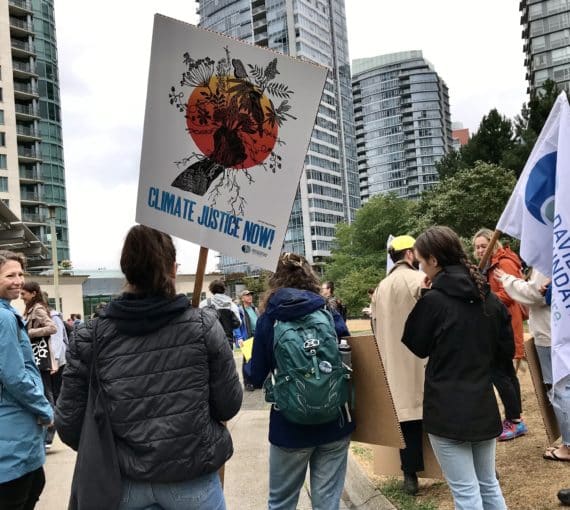
2022
Foundation milestones
- Quebec bans fossil fuel development, the first jurisdiction on Earth to close the door on oil, gas and coal extraction in its territory. This victory is achieved thanks to relentless pressure from activists, DSF, other ENGOs and Indigenous Peoples.
- Building a better future for all. DSF is leading the work of the Well-Being Economies Alliance for Canada and Sovereign Indigenous Nations, putting quality of life and health of the natural world first.
- Healing forests. DSF partners with the National Healing Forests Initiative to help establish green spaces throughout the country to promote reconciliation, rewilding and the healing power of nature.
- Charting a clear path to clean power. The Foundation’s report “Shifting Power: Zero-Emissions Electricity across Canada by 2035” is launched. Our modelling research — the first of its kind in Canada — shows that by 2035 Canada can have an affordable, reliable national electricity grid with 100 per cent zero emissions. This plan uses renewables like solar and wind, connections between utilities, energy efficiency and innovations in storage — without fossil fuels, nuclear or new hydro.
- Securing environmental rights. After years of work by DSF’s Blue Dot movement for a Right to a Healthy Environment, on June 22, 2022, the Senate passes the bill to amend Canada’s toxics and pollution law, recognizing for the first time that right in federal law.
- Greening cities. Studies by DSF and partners, using choice modelling and measuring Toronto (“Greening Toronto to Increase Resilience and Equity”) and Ottawa (“Greening Ottawa to Increase Resilience and Equity”) residents’ preferences regarding urban forest attributes, reveal residents want a forest management approach that improves natural infrastructure and allows for greater resilience to climate change.
Environmental milestones
- The United Nations General Assembly declares a clean, healthy and sustainable environment is a universal human right.
- At the United Nations Biodiversity Conference (COP15) in Montreal, Canada, nations agree to the Kunming-Montreal Global Biodiversity Framework to guide global action to halt and reverse nature loss, including protecting 30 per cent of lands and waters and restoring 30 per cent of degraded ecosystems by 2030.